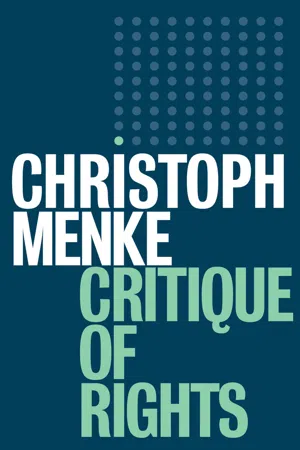
- English
- ePUB (mobile friendly)
- Available on iOS & Android
Critique of Rights
About This Book
Modern political revolutions since the 18th century have swept away traditional systems of domination by declaring that 'all men are created equal'. This declaration of equal rights is a fundamental political act – it is the political act in which the political community creates itself in relation to traditional systems of domination. But because it was generally assumed that the subject of these rights is the individual human being, the political community was subordinated to the individual. Marx discerned, rightly, that this was the paradox at the heart of the declaration of the rights of man. But while Marx was right to highlight this paradox, his proposed solution does not provide us with a sound basis for overcoming it. In this major new work, Christoph Menke adopts a different approach: he argues that we can address and overcome this paradox only by embarking on a fundamental inquiry into the nature of rights. Rights are a specific configuration of normativity: to have a right is to have a justified and binding claim. But with the equal rights declared by modern revolutions, rights assumed a particular form: the normative claim to equality was combined with an assumption about the factual conditions of social life. In this conception, society is the realm of private individuals pursuing their interests, and private interests are therefore seen as the natural basis for politics – what Menke calls 'the naturalization of the social'. By laying bare this conception which lies at the basis of political literalism and modern law, Menke is able to criticize and move beyond it, opening up a new way of understanding rights that no longer involves the disempowering of the political community. This radical critique of rights and of modern law is a major contribution to critical theory and legal theory and it will be of great interest to students and scholars in social and political theory, philosophy and law.
Frequently asked questions
Information
Part I
History: The Legalization of the Natural
Notes
- 1. Michel Villey, La formation de la pensée juridique moderne, ed. by Stéphane Rials (Paris: Quadrige/PUF, 2006), 267.
1
A PHILOSOPHICAL HISTORY OF RIGHT’S FORM
a right of using is a licit power [potestas licita] of using an external thing of which one ought not be deprived against one’s will, without one’s own fault and without reasonable cause, and if one has been deprived, one can call the depriver into court.1Lordship [dominium] is a principal human power of laying claim to and defending some temporal thing in a human court. “Human power” separates this lordship from the divine lordship.2
For Right in this Place signifies meerly that which is just, and that too rather in a negative than a positive Sense…. There is another signification of the word right, different from this, but yet arising from it, which relates directly to the person. In which sense, right is a moral quality annexed to the person, justly entitling him to possess some particular privilege, or to perform some particular act [C.M. - qualitas moralis personae competens ad aliquid juste habendum vel agendum]. This right is annexed to the person.5
Sometimes “right” means an ethical claim [C.M. – moralem facultatem] to a thing or the right to a thing, whether we are dealing with an actual right of ownership or merely with the right to share in something. Right, in this sense, is the proper object of justice…. But “right” also characterizes law, which is a norm for ethically good action and which establishes a certain consistency in things. In this sense …, “right” coincides with “law.” To put this concisely, we can call the first meaning “useful right” [ius utile] and the other meaning “ethical right” [ius honestum], or the first meaning could be called “real right” [reale] and the second meaning “lawful right” or “legal norm” [legale].6
For though they that speak of this subject use to confound Jus and Lex, Right and Law, yet they ought to be distinguished, because RIGHT consiste...
Table of contents
- Cover
- Front Matter
- Marx’s Puzzle
- Part I History: The Legalization of the Natural
- Part II Ontology: The Materialism of Form
- Part III Critique: The Authorization of One’s Own
- Part IV Revolution: The Dialectic of Judgment
- Law and Violence
- Index
- End User License Agreement